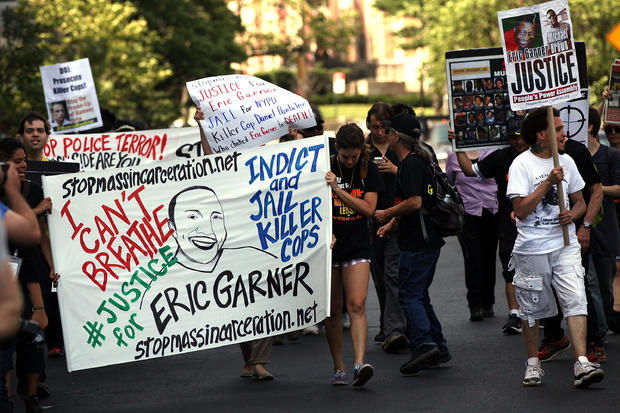A long-delayed disciplinary trial is set to begin for the New York City police officer accused of using a banned chokehold in the July 2014 death of Eric Garner, an unarmed black man whose pleas of “I can’t breathe” became a rallying cry against police brutality. Officer Daniel Pantaleo’s trial is scheduled to start Monday at police headquarters.
Protesters demanding Pantaleo be fired blocked Manhattan’s busy FDR Drive Monday morning, causing major backups during the morning rush hour, reports PIX11-TV.
Pantaleo could face penalties ranging from the loss of vacation days to firing if he’s found to have violated department rules. He denies wrongdoing.
Trending News
A ruling last week requires that the police watchdog agency bringing the case prove not only that Pantaleo violated department rules, but that his actions fit the criteria for criminal charges. A grand jury has declined to indict Pantaleo on criminal charges, and federal prosecutors face a July deadline to determine whether to file civil rights charges.
Pantaleo has been on desk duty since Garner’s death.
“It has been five long years,” Garner’s mother, Gwen Carr, told The Associated Press last week. “Pantaleo and all those other officers who actually murdered my son that day, they are still collecting their salaries. They still go home every day and it’s business as usual with them. But with me, we relive this every day.”
Pantaleo has remained on the city payroll, stripped of his gun and badge but pulling in a salary peaking at more than $120,000 in 2017, according to city payroll records.
The NYPD argued the federal investigation was holding up Pantaleo’s disciplinary case. Last summer, however, the department decided to move forward anyway. It will begin 1,761 days after Garner’s death.
The Civilian Complaint Review Board said it expects to call fewer than 20 witnesses during the trial expected to last two weeks. Stuart London, Pantaleo’s attorney, said he’ll bring up to 10 people to the stand. They include a retired NYPD training sergeant who London said taught Pantaleo an approved technique known as a “seat-belt hold” that is being confused for a chokehold.
The NYPD’s chief surgeon ruled in 2014 that Pantaleo hadn’t used a chokehold on Garner, contradicting the medical examiner’s findings, London said. London said part of his defense case would focus on attacking the medical examiner’s report, which he called a “political document” and “the worst possible autopsy ever done.”
Pantaleo’s union, the Police Benevolent Association, has blamed the 350-pound Garner’s poor health and resisting arrest for his death. Garner shouted at officers as they approached him, saying: “Every time you see me, you want to mess with me. I’m tired of it. It stops today. I’m minding my business. Please just leave me alone.”
Garner, a father of six, had been arrested for selling untaxed cigarettes numerous times and was suspected of doing the same when officers approached him, police said. The man who recorded video of the confrontation that quickly went viral said that wasn’t true and that Garner had just broken up a fight between two other men.
Garner, who had asthma, suffered a heart attack in an ambulance and was pronounced dead at a hospital.
The city paid Garner’s family $5.9 million in 2015 to settle a wrongful death claim. Carr said that money went to Garner’s wife, not her.
Use of force complaints against the NYPD have fallen sharply in the years since Garner’s death, according to data compiled by the review board. In 2014, there were 2,412. In 2018, there were 1,764, marking a 27% drop. But alleged chokeholds have still been a problem. Last year, the review board reported receiving 133 chokehold complaints. So far in 2019, there have been 39.
The NYPD hasn’t fired an officer for a fatal chokehold since Francis Livoti, who was dismissed from the department and convicted by a federal jury for violating the civil rights of a Bronx man prosecutors say died after Livoti used a chokehold on him in 1994.
A few weeks after Garner’s death, 18-year-old Michael Brown was fatally shot by a police officer in Ferguson, Missouri. A few months after that, officers in Cleveland fatally shot 12-year-old Tamir Rice. Other confrontations followed between police officers and people of color, sparking tensions, calls for reform and nationwide protests.
Carr, turning to activism as a means of healing from her grief, lobbied for an executive order directing New York’s attorney general’s office to review cases in which unarmed civilians are killed by police. Gov. Andrew Cuomo, a Democrat, signed it a year after her son’s death. She also wrote about her life and Garner’s death in a book, “This Stops Today,” published last October.
“All of this needs to stop,” Carr said. “This is very important to me for Eric, but not only for Eric — for the other families, and for the families that we know will be.”


